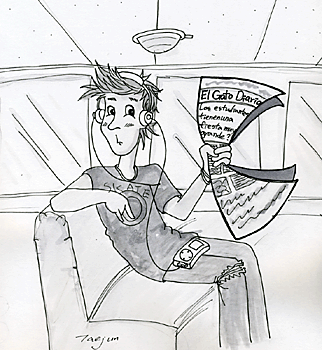
Illustration by Taejun Lim
|
|
By Alan Eder
Arizona Daily Wildcat
Wednesday, November 2, 2005
Print this
Spanish is the new trendy language. Much like The Postal Service, the rhythms are catchy, the lyrics are hip and the sound is unique. Its listeners are also growing at an impressive rate.
It is to no surprise, then, that a member of our student government is currently touting a proposal to have the Arizona Daily Wildcat include Spanish articles.
"What a wonderful, novel idea," I initially thought. Majoring in Spanish myself, the thought tickled my soul and warmed the cockles of my bilingual heart.
But this issue is a classic case of "Where you stand is where you sit." While the plan is well-intentioned, it fails on a number of levels from the perspective of those who provide the news.
After talking with several senators, a number of interesting and important assertions were made. Associated Students of the University of Arizona Sen. Alexis Ettinger, who used the Spanish article issue as a platform during her campaign last semester, has plans to distribute a revised survey that gauges student interest in the idea.
After initially speaking with students, she noted that they were enthusiastic about Spanish articles; she commented how those who had never read the Wildcat would be more likely to read it if such articles were included.
According to Ettinger, including Spanish articles would also be good practice for students who did not otherwise speak the language. She noted that among many of today's employers, it is "strongly recommended that you learn a second language."
Sen. Patrick Cook added that the Spanish club was in support of the idea and could provide translators. Conceivably, students from the department of Spanish and Portuguese could also translate articles for course credit.
However, these ideas fail to take into account the logistical nightmare that it would cause. Translators could edit for grammar, but copy editors who are not bilingual would have no control over the content. This fact alone creates a powerful index of incompatibility between what the senators demand and what the Wildcat is capable of doing.
Cook argues that by targeting a new demographic, the Wildcat would be a "pioneer" in capturing a Spanish-speaking audience.
But while there are many Hispanic students on campus, it is safe to say that many of them are already fluent in English. There seems to be little purpose, then, in targeting such a narrow audience. Está claro que hay más estudiantes aquí que no pueden entender español con respeto a los que no entienden inglés.1
Now, I am all for multiculturalism, don't get me wrong. But I do not travel to Latin America expecting to speak English, much less read it in a local newspaper.
Among other things, students are here to improve their English, and a Spanish language newspaper, at least at the collegiate level, does not hold much utility. Students come here with the explicit intention of immersing themselves in the language and culture of the U.S., and the common tongue is English.
According to Eric Fuhrmann, a senior majoring in English and German studies who reads the Wildcat religiously, "student government should not play a role in student media." Indeed, I wrote about China, communism and state-controlled media last week, pero hombre, las acciones de ASUA toma el pastel.2
 |
|
At the very least, if the Wildcat is to print articles in Spanish, then ASUA should have to hold forums in español.
|
 |
As Fuhrmann says, "It does not hurt to have more Spanish publications. I just do not think that this is the right forum."
This is not an issue about tolerance and diversity then, but rather one of pragmatism and a separation of responsibilities.
Two Spanish audience-oriented publications can already be picked up on campus: La Estrella de Tucson and El Independiente. It is also worth noting that the Arizona Daily Star and the Tucson Citizen include Spanish sections. Moreover, with our wired campus, students who wish to practice their skills can access BBC Mundo or CNN en Español.
By writing my columns in el nuevo idioma,3 I could gain a Spanish-speaking audience, but at the expense of my English audience. Unfortunately, by catering to one group of individuals, I lose the majority of my current readers.
While ASUA's recommendation is an interesting one, we have to ask if it is really necessary. In light of the narrow audience it targets, the existence of alternative sources and the feasibility issues, this does not appear to be the case.
At the very least, if the Wildcat is to print articles in Spanish, then ASUA should have to hold forums in español.
1. It's clear that there are more students here who are not able to understand Spanish in respect to those who don't understand English.
2. But, man, the actions of ASUA take the cake.
3. The new language
Alan Eder is a senior majoring in political science and Spanish senior. He can be reached at letters@wildcat.arizona.edu.
